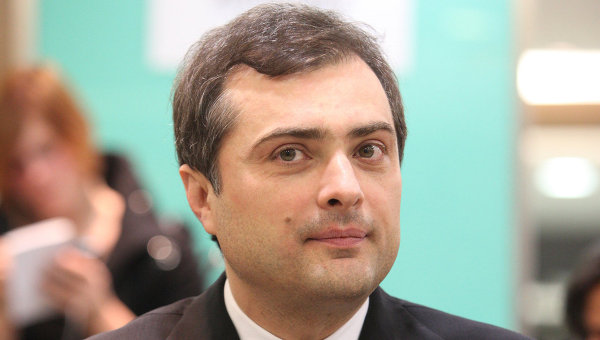
Is Surkov Readying a New Challenge to Kazan?
Publication: Eurasia Daily Monitor Volume: 11 Issue: 36
By:

Vladislav Surkov, the Kremlin’s overseer of the breakaway republics of Abkhazia and South Ossetia and a man who recently discussed building a bridge between Russia and Crimea that could serve as the basis for a possible move by Moscow against that part of Ukraine, recently visited Kazan, Tatarstan. It appears that while there, he met with representatives of the Kryashens, a group that identifies itself as a self-standing nation but that Kazan insists simply consists of Orthodox Christian Tatars. Both because the Russian government has sought to play up that division in the past and because the Moscow media have been full of stories about the Kryashens and their supposed “plight” under the Tatars, Surkov’s visit suggests that Moscow may be preparing a new challenge to the largest and most influential non-Russian republic. At the very least, it signals that Surkov is again playing a large and destructive role on the Kremlin’s behalf.
According to Rashit Akhmetov, editor of the independent weekly Zvezda Povolzhya and the man who reported about Surkov’s contacts with the Kryashens a week ago, Surkov’s visit calls attention to a division in Moscow over how to deal with Tatarstan’s increasingly independent course. One group favors developing good relations with the current authorities there, but another is committed to undermining them and replacing them with Moscow’s own people and possibly amalgamating the republic with nearby and predominantly ethnic Russian oblasts and krais (zvezdapovolzhya.ru/obshestvo/patrul-23-02-2014.html).
At the present moment, the Kazan editor says, Russian President Vladimir Putin is well-disposed to Tatarstan and is even considering the appointment of Tatarstani President Rustam Minnikhanov as Russian prime minister later this spring in place of Dmitry Medvedev. Consequently, Akhmetov says, those opposed to Tatarstan and those who are supporting Medvedev or someone else have been striking back, using Joseph Goebbels–like “big lies” about both.
Putin, “of course, as someone who comes out of the KGB system, naturally applies the methodology of ‘divide and conquer’ [and] of ‘good cop–bad cop’” in relation to Tatarstan as well as everywhere else, Akhmetov continues. And consequently, he too is involved with the efforts of those like Surkov and Rais Suleymanov, who has now moved to Moscow after being ousted as head of the Russian Institute for Strategic Studies (RISI) office in Kazan. The Kazan RISI office’s new head, Suleymanov says, is “in sympathy with the Tatar ethnocracy.”
Attacks on Tatarstan by Suleymanov for its supposed support of the burning of Orthodox churches in the republic and its backing of “Muslim patrols” against ethnic Russians are just the latest examples of a new trend in Russian public discourse, the editor of Zvezda Povolzhya says. “If earlier, they made mountains out of molehills, now they make mountains out of nothing” in the hopes that such attacks will convince those who do not know the reality that “Tatarstan is not the North Caucasus, that Islam there is a matter of daily life, and that Tatars overwhelmingly are very pragmatic and law-abiding.”
The Kryashens, who number 35,000 in the Russian Federation as a whole and somewhat fewer than that in Tatarstan itself, are the latest object of Moscow’s “conspiratorial” attention, Akhmetov continues. A Tatar who serves in the Russian Duma said his colleagues were asking him, as a result of articles by Suleymanov and others of his ilk, “Why are people in Tatarstan burning churches? How will this all end?” Not the way some in Moscow have presented it, that is for sure, Akhmetov insists. Sergey Nikitin, who heads the Tatarstani branch of nationalist politician Sergei Baburin’s All-People’s Union, says that he believes that Orthodox Russian nationalists burned the churches as a provocation. And Damir Iskhakov, a specialist on the Kryashens, says that “90 percent of the Kryashens consider themselves Tatars” and that “the titanic efforts to split” them off have not worked.
If the Kryashens are a separate people, as some Russians insist, and not Orthodox Tatars, as Tatars and most experts say, Akhmetov continues, “where, then, are the Tatars who adopted Christianity under the influence of the policy of the Christianization of the Middle Volga over the course of 350 years?” If none exist, it is an indication that the Christianization policy has failed and should be stopped. He notes as well that even before 1917, most experts found that “the Kryashens were much more distrustful of the Russians than the Tatars” and that “they represented a strange symbiosis that could be characterized as Islamicized Christianity where the Islamic foundation is included in a Christian package.”
Surkov’s involvement with the Kryashens may be important in yet another way. It may be part of an effort among some in the Russian elite to block Putin’s rumored plans to name Minnikhanov as prime minister of the Russian Federation. That possibility is suggested as well by the recent remarks of Murtaza Rakhimov, the former president of Bashkortostan, who accused the Tatars of separatism, said that Kazan wants to “tatarize” the Bashkirs, and even suggested that Moscow should install an ethnic Russian as president of Bashkortostan.




